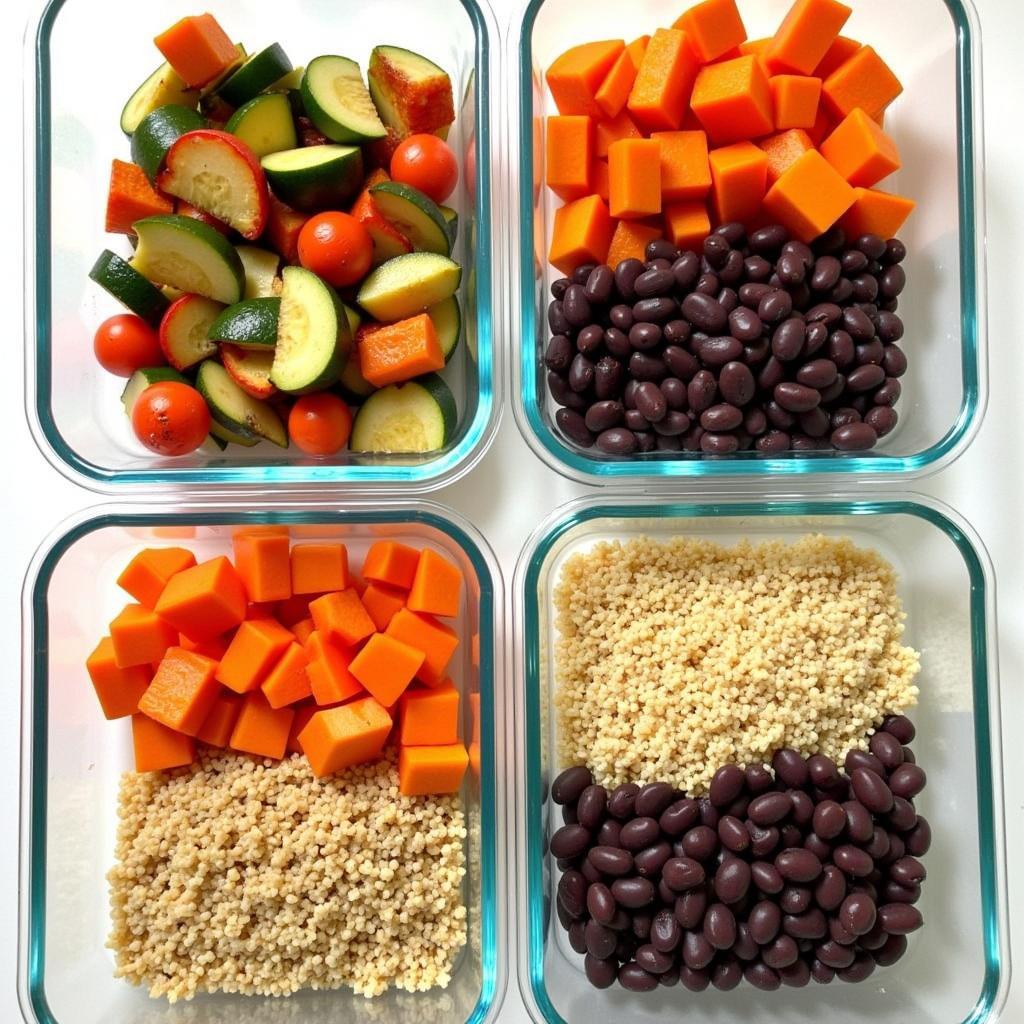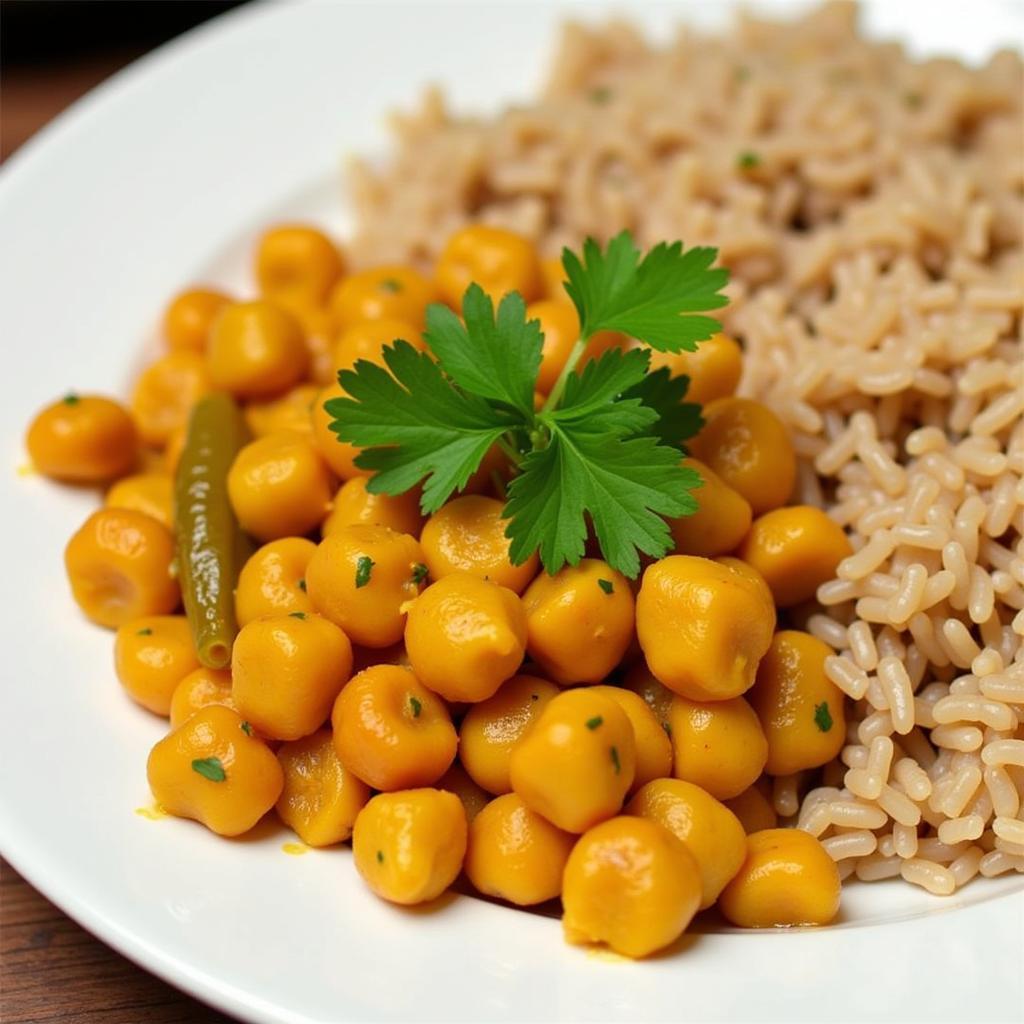Eating healthy doesn’t have to mean spending a fortune. With a little planning and creativity, you can enjoy delicious and nutritious Whole Food Meals On A Budget. This guide will provide practical tips and strategies to help you make the most of your grocery dollars while prioritizing your well-being. Check out our guide to purchasing food in bulk for additional savings tips.
Planning Your Whole Food Meals on a Budget
The key to successful budget-friendly whole food eating is planning. Creating a weekly meal plan can significantly reduce food waste and impulse purchases. Start by browsing grocery store flyers and identifying seasonal produce, which is typically more affordable. Then, build your meals around these ingredients. Consider batch cooking staples like grains, beans, and roasted vegetables to save time and effort throughout the week.
Don’t forget to factor in leftovers! Planned-over meals can stretch your budget even further and minimize cooking time. For example, roasted chicken one night can become chicken salad sandwiches or soup the next. Think creatively about how you can repurpose ingredients to maximize their value.
 Budget-Friendly Whole Food Meal Prep: A colorful spread of prepped whole foods, including roasted vegetables, cooked grains, and beans, organized in containers for easy meal assembly throughout the week.
Budget-Friendly Whole Food Meal Prep: A colorful spread of prepped whole foods, including roasted vegetables, cooked grains, and beans, organized in containers for easy meal assembly throughout the week.
Smart Shopping Strategies for Whole Food Meals
When shopping for whole foods on a budget, focus on filling your cart with nutrient-dense staples. Prioritize items like:
- Fruits and vegetables: Opt for in-season produce and consider frozen or canned options, which can be just as nutritious and often cheaper.
- Whole grains: Oats, brown rice, quinoa, and whole wheat bread offer sustained energy and fiber.
- Legumes: Beans, lentils, and chickpeas are excellent sources of protein and fiber and are incredibly affordable.
- Nuts and seeds: Buy in bulk and store properly to extend their shelf life.
Consider making some items from scratch. For example, homemade granola or trail mix can be significantly cheaper than pre-packaged versions. Also, don’t be afraid to explore less common cuts of meat or plant-based protein sources like tofu or tempeh, which are often more budget-friendly. Explore our guide on boil in a bag food for quick and easy meal options.
Delicious and Affordable Whole Food Recipes
Eating healthy on a budget doesn’t mean sacrificing flavor or variety. There are countless delicious and affordable whole food recipes available online and in cookbooks. Here are a few ideas to get you started:
- Lentil soup: This hearty and flavorful soup is packed with protein and fiber and can be made with pantry staples.
- Roasted vegetable and grain bowls: Combine your favorite roasted vegetables with a base of quinoa or brown rice for a satisfying and customizable meal.
- Chickpea curry: This aromatic and flavorful dish is a budget-friendly and delicious way to enjoy plant-based protein.
- Oatmeal with fruit and nuts: A simple and nutritious breakfast that can be customized with your favorite toppings.
 Affordable Chickpea Curry: A steaming bowl of chickpea curry served with brown rice, garnished with fresh cilantro.
Affordable Chickpea Curry: A steaming bowl of chickpea curry served with brown rice, garnished with fresh cilantro.
Remember to explore our article on foam food trays to learn more about sustainable food packaging options.
Making Whole Food Meals on a Budget a Sustainable Habit
Transitioning to a whole food diet on a budget can take time and effort. Start small and gradually incorporate more whole foods into your meals. Don’t be afraid to experiment with new recipes and ingredients.
Focus on building sustainable habits that you can maintain long-term. Small changes over time can make a big difference in your overall health and well-being. Consider buying atun food for a healthy and affordable protein source.
“Eating healthy on a budget is absolutely achievable,” says registered dietitian, Sarah Miller. “With smart planning and a focus on whole foods, you can nourish your body without breaking the bank.”
Conclusion
Whole food meals on a budget are entirely possible with the right approach. By planning your meals, shopping strategically, and exploring creative recipes, you can prioritize your health and well-being without overspending. Embrace the journey of discovering delicious and affordable ways to nourish your body with whole foods. You can also check out our article on food prices 1975 for an interesting historical perspective.
FAQ
- What are some budget-friendly whole foods?
- Beans, lentils, rice, oats, seasonal produce, frozen fruits and vegetables.
- How can I save money on whole foods?
- Plan your meals, buy in bulk, cook at home, and shop sales.
- What are some easy whole food recipes?
- Lentil soup, roasted vegetable bowls, chickpea curry, oatmeal.
- How can I make whole food meals on a budget sustainable?
- Start small, focus on gradual changes, and find recipes you enjoy.
- Are frozen fruits and vegetables as nutritious as fresh?
- Yes, they can be just as nutritious and are often more affordable.
- Where can I find more whole food recipes?
- Online resources, cookbooks, and food blogs.
- How can I reduce food waste?
- Plan your meals, use leftovers creatively, and store food properly.
Common Scenarios
- Scenario 1: A busy parent needs quick and affordable weeknight meals. Solution: Prepare large batches of grains, beans, and roasted vegetables on the weekend for easy assembly throughout the week.
- Scenario 2: A college student wants to eat healthy on a limited budget. Solution: Embrace budget-friendly staples like lentils, rice, and frozen vegetables to create nutritious meals.
- Scenario 3: A family wants to incorporate more whole foods into their diet without breaking the bank. Solution: Focus on seasonal produce, cook at home more often, and plan meals around sales and discounts.
Further Exploration
- For more information on preparing budget-friendly meals, visit our article on boil in a bag food.
- Learn more about sustainable food storage solutions in our guide to foam food trays.
Contact us at Phone Number: 02437655121, Email: [email protected] or visit us at 3PGH+8R9, ĐT70A, thôn Trung, Bắc Từ Liêm, Hà Nội, Việt Nam. We have a 24/7 customer support team.